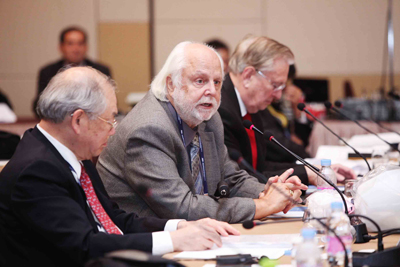On November 8, KAIST hosted its annual International Presidential Forum on Global Research Universities (IPFGRU) in the Millennium Seoul Hilton Hotel, Seoul Korea. Representatives from 46 institutions from 27 countries participated in the event and shared their vision and knowledge on the theme of the forum, "Borderless and Creative Education."

This year's IPFGRU was divided into a morning session and two afternoon sessions. Each session was proceeded by having nine to ten representatives delivering their individual speeches for ten minutes; the sessions were then followed by an open discussion among the participants for forty minutes.
Prior to the onset of the morning session, President Nam Pyo Suh delivered his opening remarks to greet the guests. During his speech, he emphasized the necessity of creating "Borderless and Creative Education" for research universities to solve global problems. The participants then received the Declaration for them to sign, but the siging was suddenly halted by Chancellor Robert Birgeneau of UC Berkeley. He suggested to the participants of adding the aspect of "teaching" to the Declaration since all the participants are teachers before they are designers of educations systems. Upon agreement, Chairman Hee-Beom Lee of STX Heavy Industries delivered his congratulatory speech. Chancellor Birgeneau then gave his plenary speech to start the morning session.
During his plenary speech, Chancellor Birgeneau highlighted the concept of crossing borders between nations as well as between the government and education systems. He pointed out that the number of students studying overseas is ever increasing and the current education systems in research universities must be changed to be able to cultivate such a diverse group of students and their potentials. Presenting statistics on the correlation between university excellence and economic development, Chancellor Birgeneau also asserted that governments and universities must form close ties between each other to induce synergistic effects on national development.
Throughout the rest of morning session and until the end of the forum, the consensus among the participants that the current education systems must be shifted in their paradigm to make them borderless and creative. In formulating borderless education, the participants agreed upon promoting interdisciplinary research and programs. They claimed that such efforts are needed to lower barriers between different fields of study. In doing so, students will cooperate with people from diverse backgrounds, assimilate lessons from various disciplines and integrate them to come up with creative solutions to the challenges they will face in the future. The representatives also added that borders must be lowered not just of universities, but anywhere else, between nations and industries, not only within themselves but also with each other.
While exchanging ideas over creative education, President Suh introduced KAIST's pilot program, the "I-Four Education." This education system, based on the four I's - Information Technology, Individualized, Integrated and International - aims to create a more student-initiated learning environment. According to President Suh, young people today are highly individualized and should no longer be subjected to conventional education system. He compared the conventional education system to American football, in which the professors are quarterbacks who "throw" concepts and theories hoping that students as catchers would receive them. Instead, the I-Four Education program employs Internet-based learning materials, allowing students to create their own learning environments. Although some representatives agreed upon the effectiveness of the program, some remained skeptical. Neil Pappalardo, Chairman and CEO of Medical Information Technology, even worried that if there are no formal lectures and that "anyone" can watch recorded videos of lectures from "anytime and anywhere" through the Internet, the need for residential colleges, the very existence of themselves, would come into question.
Dong Hee Lee
postdh@hotmail.com

